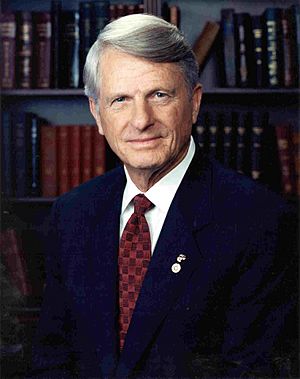Zell Miller facts for kids
Quick facts for kids
Zell Miller
|
|
|---|---|
 |
|
| United States Senator from Georgia |
|
| In office July 24, 2000 – January 3, 2005 |
|
| Preceded by | Paul Coverdell |
| Succeeded by | Johnny Isakson |
| 79th Governor of Georgia | |
| In office January 14, 1991 – January 11, 1999 |
|
| Lieutenant | Pierre Howard |
| Preceded by | Joe Frank Harris |
| Succeeded by | Roy Barnes |
| 8th Lieutenant Governor of Georgia | |
| In office January 14, 1975 – January 14, 1991 |
|
| Governor | George Busbee Joe Frank Harris |
| Preceded by | Lester Maddox |
| Succeeded by | Pierre Howard |
| Member of the Georgia State Senate from the 50th district |
|
| In office 1963–1965 |
|
| Preceded by | Hamilton McWhorter, Jr. |
| Succeeded by | Robert King Ballew |
| Member of the Georgia State Senate from the 40th district |
|
| In office 1961–1963 |
|
| Preceded by | Russell Ellis Cannon |
| Succeeded by | Dan I. MacIntyre III |
| Personal details | |
| Born |
Zell Bryan Miller
February 24, 1932 Young Harris, Georgia, U.S. |
| Died | March 23, 2018 (aged 86) Young Harris, Georgia, U.S. |
| Political party | Democratic |
| Spouse |
Shirley Carver
(m. 1954) |
| Children | 2 |
| Education | Young Harris College University of Georgia (BA, MA) |
| Military service | |
| Allegiance | |
| Branch/service | |
| Years of service | 1953–1956 |
| Rank | |
Zell Bryan Miller (February 24, 1932 – March 23, 2018) was an American author and politician from Georgia. He was a member of the Democratic Party. Miller served as lieutenant governor from 1975 to 1991. He was the 79th governor of Georgia from 1991 to 1999. Later, he became a U.S. senator from 2000 to 2005.
As a senator, Miller was known as a conservative Democrat. This means he was a Democrat but held some views that were more traditional or conservative. Earlier, as governor, he was seen as more liberal, meaning he supported more progressive ideas. In 2004, he supported Republican President George W. Bush. This was unusual because Bush was running against the Democratic candidate, John Kerry. Miller was a special speaker at both major political parties' national meetings. He spoke at the Democratic meeting in 1992 and the Republican meeting in 2004.
Miller decided not to run for the Senate again in 2004. After leaving the Senate, he worked for a law firm. He also shared his opinions as a contributor for Fox News. For 16 years after Miller left office, no Democrats from Georgia were elected to the U.S. Senate. This changed when Raphael Warnock won Miller's old seat in 2021.
Contents
Early Life and Military Service
Zell Miller was born in Young Harris, Georgia, a small mountain town. His father, Stephen Grady Miller, was a teacher who died when Zell was only 17 days old. His mother, Birdie Bryan, raised him. He also had an older sister named Jane. As a child, Miller lived in both Young Harris and Atlanta. He earned a degree from Young Harris College in his hometown. He also attended Emory University.
After the Korean War ended, Miller joined the United States Marine Corps. He served for three years and became a sergeant. Miller often talked about how important his time in the Marines was to him.
After his military service, Miller went to the University of Georgia in 1956. He earned both bachelor's and master's degrees in history. He then taught history at Young Harris College.
Political Journey
Miller's parents were involved in local politics in North Georgia. Before becoming a politician, Miller taught history and political science at Young Harris College. He served as mayor of Young Harris from 1959 to 1960. He was then elected to the Georgia State Senate for two terms, from 1961 to 1964. He tried to get elected to the United States House of Representatives in 1964 and 1966 but did not win.
He later worked for Georgia Governor Lester Maddox. Miller also helped lead the Georgia Democratic Party. He was in charge of Walter Mondale's presidential campaign in Georgia in 1984.
Miller became Lieutenant Governor of Georgia in 1974. He served four terms, from 1975 to 1991. This made him the longest-serving lieutenant governor in Georgia's history. During this time, he worked with Governors George Busbee and Joe Frank Harris. In 1980, Miller tried to win a seat in the United States Senate but lost in the primary election.
Serving as Governor
Miller was elected governor of Georgia in 1990. He won against Johnny Isakson, who later became a U.S. Senator. During his campaign, Miller promised to serve only one term as governor. However, he later ran for and won re-election in 1994.
In 1991, Miller supported Bill Clinton of Arkansas for president. Miller gave a major speech at the 1992 Democratic National Convention in New York City. Twelve years later, he gave another important speech at the 2004 Republican National Convention. This speech was for the opposing party.
As governor, Miller was known for a law called "two strikes and you're out." This law meant that if a person committed certain serious crimes a second time, they would automatically get a life imprisonment sentence without parole. This law started on January 1, 1995.
Miller strongly supported public education as governor. He helped create the HOPE Scholarship program. This program used money from the state lottery to pay for college tuition. Students could get the scholarship if they had good grades in high school and college. The HOPE Scholarship program still helps Georgia students go to college today.
After leaving the governor's office in 1999, Miller taught at Young Harris College, Emory University, and the University of Georgia.
Time in the Senate

When U.S. Senator Paul Coverdell died in 2000, Governor Roy Barnes appointed Miller to fill the Senate seat. Miller was still very popular in Georgia. He won a special election in November 2000 to keep the seat. He defeated former U.S. Senator Mack Mattingly.
During his time in the Senate, Miller often supported Republicans and criticized Democrats. He agreed with many of President George W. Bush's plans. These included tax cuts and allowing oil drilling in the Arctic National Wildlife Refuge. Even with these differences, Miller always said he would remain a Democrat. He even campaigned for fellow Georgia Democrat Max Cleland in 2002.
In his 2003 book, A National Party No More: The Conscience of a Conservative Democrat, Miller wrote about the Democratic Party. He believed the party had changed and no longer represented the same ideas it did in the past. He felt the Republican Party now held the conservative Democratic ideas he believed in. His book was on the New York Times Best Seller list for nine weeks.
In 2003, Miller announced he would not run for re-election. He also said he would support President George W. Bush in the 2004 presidential election. This was instead of supporting any of the Democratic candidates. Miller also suggested changing the Seventeenth Amendment to the United States Constitution. This amendment allows people to directly elect U.S. Senators. Miller thought state legislatures should elect senators instead.
Supporting Republicans in 2004
In his speech at the 2004 Republican National Convention on September 1, 2004, Miller criticized the Democratic Party. He specifically mentioned Senators Ted Kennedy and John Kerry. He said Kerry's votes against defense spending showed he wanted to weaken the U.S. military.
The speech was very popular with the people at the convention. After the speech, Miller had some intense interviews with news reporters. In one interview with Chris Matthews on MSNBC, Miller became upset. He told Matthews to "get out of my face" and wished they lived in a time when people could challenge each other to a duel. Miller later said he regretted that interview.
After George W. Bush won the 2004 election, Miller said the Republican victories showed that Democrats were out of touch with most Americans.
Later Endorsements
In 2008, Miller supported Republican Saxby Chambliss in a Senate election. He also criticized President Barack Obama. In 2012, Miller helped lead the campaign for Republican presidential candidate Newt Gingrich. He also supported Republican Doug Collins for Congress that same year.
In 2014, Miller supported candidates from both parties in Georgia. He appeared in a TV ad for Michelle Nunn, a Democratic candidate for the U.S. Senate. He praised her as someone who could bring people together. However, he also supported the Republican governor, Nathan Deal, for re-election.
Life After Politics
In August 2005, President Bush appointed Miller to the American Battle Monuments Commission. This group helps maintain U.S. military cemeteries and memorials.
In 2005, Miller was elected to the Board of Directors of the National Rifle Association.
Miller spoke at an event called "Justice Sunday II" in 2005. This event was organized by conservative Christians. Miller criticized the United States Supreme Court. He said it had "removed prayer from our public schools" and was ready to "discard ... the universal institution of marriage."
The Student Learning Center at the University of Georgia was renamed the Zell B. Miller Learning Center in October 2008.
Miller's health declined in the late 2000s. He developed Parkinson's disease and other health issues. In 2016, his grandson, Bryan Miller, started the Miller Institute Foundation to honor his grandfather's work. By October 2017, Miller had officially retired from public life.
Passing Away
Zell Miller died on March 23, 2018, at his home in Young Harris, Georgia. He passed away due to complications from Parkinson's disease. His state funeral was held in Atlanta on March 28. Many important people attended, including Governor Nathan Deal, U.S. Secretary of Agriculture Sonny Perdue, Senator Johnny Isakson, and three former U.S. presidents: Jimmy Carter, Bill Clinton, and George W. Bush.
Awards
In 1998, Oglethorpe University gave him an honorary degree called Doctor of Laws.
Published Works
- Miller, Zell (1976). Mountains Within Me.
- Miller, Zell (1983). Great Georgians. ISBN 9993788627.
- Miller, Zell (1984). They Heard Georgia Singing: Great Georgians Vol 2.
- Miller, Zell (1997). Corps Values: Everything You Need to Know I Learned In the Marines. ISBN 1563523876.
- Miller, Zell (1998). "Listen to this Voice" Selected Speeches of Governor Zell Miller. Mercer University Press. ISBN 086554641X.
- Allen, Robert E. (1999). The First Battalion of the 28th Marines on Iwo Jima: A Day-By-Day History from Personal Accounts and Official Reports, With Complete Muster Rolls. ISBN 0786405600. (foreword by Miller)
- Miller, Zell (2003). A National Party No More: The Conscience of a Conservative Democrat. Stroud & Hall Publishers. ISBN 0974537616. https://archive.org/details/nationalpartynom00mill.
- Parker, Dick (2003). What'll Ya Have: A History of the Varsity. Looking Glass. ISBN 1929619189. (foreword by Miller)
- Miller, Zell (2005). A Deficit Of Decency. Stroud & Hall. ISBN 0974537632. https://archive.org/details/deficitofdecency00mill.
- Zoller, Martha (2005). Indivisible: Uniting Values for a Divided America. Stroud & Hall. ISBN 0974537640. https://archive.org/details/indivisibleuniti0000zoll. (foreword by Miller)
- Miller, Zell (2007). The Miracle of Brasstown Valley. Stroud & Hall. ISBN 978-0979646201.
- Miller, Zell (2009). Purt Nigh Gone: The Old Mountain Ways. Stroud & Hall. ISBN 978-0979646232.
Images for kids
 | James Van Der Zee |
 | Alma Thomas |
 | Ellis Wilson |
 | Margaret Taylor-Burroughs |


